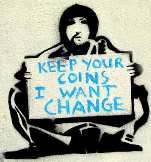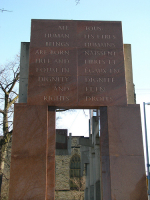2008: Celebrating the 60th Anniversary of the Universal Declaration of Human Rights
Universal Declaration of Human Rights: Introduction
Sixty years ago, nations of the world joined together in recognizing that all peoples, in all nations, are free and equal regardless of race, religion, economic status, age, gender or other personal characteristics. Through the signing of the Universal Declaration of Human Rights in 1948, the United Nations brought into being the first international document recognizing human rights as the foundation of peace, justice and freedom in the world.

The Universal Declaration outlines 30 basic rights essential for all human beings to achieve their full potential and to live a life free of fear and want. It was a unique approach that developed from the world saying 'never again' to the horrific events of World War Two, a war that brought a scale of atrocity never previously witnessed. The global death count is estimated to have been more than 50 million. War crimes were widespread: from the infamous Holocaust in which Nazi Germany sought to eliminate 'undesirables' such as Jews, Poles, Slavs, Roma, Sinti, the mentally and physically disabled, homosexuals and other persons, to the use of sex slaves, otherwise known as 'comfort women', by Japanese soldiers. Labour camps were used throughout the world and, disturbingly, World War Two brought the first testing of biological warfare by Japan and the use of atomic bombs in Nagasaki and Hiroshima by the United States of America. Read more...
Poverty

Article 25 of the Universal Declaration of Human Rights states, that everyone is entitled "to a standard of living for the health and well-being of himself and of his family." In other words, having a certain quality of life and an adequate standard of living is a fundamental human right. Without access to basic needs such as good nutrition and adequate housing, a child cannot go to school and learn effectively. This illustrates the indivisibility of human rights; in order to access the right to education or the right to health, every person needs an adequate standard of living that will enable them to access other opportunities.
The United Nations Committee on Social, Economic and Cultural Rights defines poverty as "a human condition characterized by sustained or chronic deprivation of the resources, capabilities, choices, security and power necessary for the enjoyment of an adequate standard of living and other civil, cultural, economic, political and social rights." The Millennium Development Goals embrace this global commitment by seeking to reduce poverty around the world by 2015. According to the World Bank, there are over 1.1 billion individuals living in absolute poverty (barely surviving on less than a $1 a day).
It is a mistake to think that poverty only exists in developing countries. One need only visit Canada's inner-cities or some Aboriginal reserves to see the evidence of poverty in our own country. Despite our wealth as a western developed nation, the persistent levels of poverty demonstrate that economic opportunity in Canada is not shared by all. Poverty is recognized as a fundamental human rights issue in Canada. Non-permanent residents such as refugees, foreign students and foreign workers, have the highest rate of poverty followed by Aboriginal people, recent immigrants, visible minorities and persons with disabilities. Poverty tends to be high among children, youth, single mothers and elderly women.
According to the Make Poverty History Campaign, one million Canadian children live in poverty. In 1989, the House of Commons unanimously voted to eliminate child poverty in Canada by the year 2000. However, in 2005, one in six Canadian children was still living in impoverished situations, with Aboriginal children over-represented in this figure.
In 2007, Campaign 2000 released a Report Card on Child and Family Poverty revealing that child poverty in Canada remains the same as it was when the House made this landmark vote 18 years ago. From Statistics Canada data, 11.7% of children still live in poverty in Canada and in a report by UNICEF, Canada ranks near the bottom of developed countries for child well-being (17th out of 23 countries). As a signatory to the United Nations Convention on the Rights of the Child, Canada has made a further commitment to advancing child well-being, and it is apparent that much work needs to be done.
The poor are frequently stereotyped as lazy, untrustworthy and irresponsible in the popular media, by landlords, financial institutions, and school officials, in stores and public places, by politicians and the general public. As a result, discrimination against people because they are poor is all too common. For instance, people may be denied apartments because they do not have a credit rating, which only can be attained by having money.
In Canada, some human rights legislation recognizes source of income or economic status as a protected ground (like race, disability or gender), while some jurisdictions, Quebec, Northwest Territories and New Brunswick, have "social condition" as a protected ground. What do you think? How would it help if people could file a human rights complaint when they experienced discrimination simply because they were poor?
Poverty means that people cannot enjoy their basic human rights. All provinces and territories and most communities in Canada have some subsidized public housing. However, this is insufficient, and anti-poverty coalitions and affordable housing committees, strive to meet the needs of the poor. Reach out and learn more about poverty in your community to see how you can help.
Learn More! Get Involved!
Resources
Campaign 2000: End Child and Family Poverty in Canada
Campaign 2000: 2007 Report Card on Child and Family Poverty in Canada
Campaign 2000 Youth Action Committee The Campaign 2000 Youth Action Committee is a youth group working to end child and family poverty in Toronto and throughout Canada. (http://yac.campaign2000.net/)
Make Poverty History
Make Poverty History is part of a global call to action against poverty.
(http://www.makepovertyhistory.ca/en)
Canadian Council on Social Development: www.ccsd.ca
See the Urban Poverty Project 2007
http://www.ccsd.ca/pubs/2007/upp
Free the Children: Child Poverty
Ontario Coalition Against Poverty
Related International Human Rights Documents
- International Covenant on Economic, Social and Cultural Rights, 1966
- Universal Declaration on the Eradication of Hunger and Malnutrition, 1974
- Declaration on the Right to Development, 1986
- Convention concerning Employment Promotion and Protection against Unemployment, 1988
- Convention on the Rights of the Child, 1989
- Beijing Declaration and Platform for Action, Fourth World Conference on Women: Action for Equality, Development and Peace, 1995



